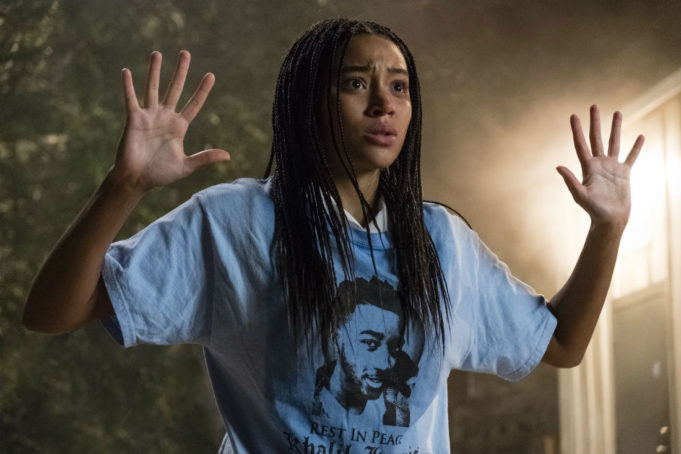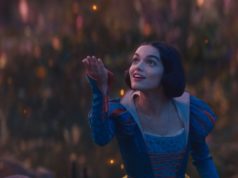Sometimes in life, you just need a black girl standing on the hood of a car telling you to burn down this whole rotten world that white people built for us. Wow, do I need that right now. The Hate U Give, which is already in a couple of Tarrant County theaters and expands to many more this weekend, is a teen romance that comes to that unlikely pass. To be fair, the movie’s way more complicated than that, but I just watched an entitled rich white guy bluster his way past sexual assault accusations to sit on the Supreme Court, so that’s the salient image I take away from this.
Adapted from Angie Thomas’ novel by the late Audrey Wells, this film opens with a scene familiar to parents of black children, as ex-con Maverick Carter (Russell Hornsby) teaches his kids how to behave when they’re pulled over by police so they don’t get shot. Years later, his daughter Starr (Amandla Stenberg) is a teenager who lives in the ‘hood but attends a mostly white private school on the other side of town, the public school nearby being both unsafe and substandard. She’s coming home from a party in her own neighborhood with Khalil (Algee Smith), a childhood friend whom she’s drifted apart from, when they’re stopped by a white cop. Starr watches as the cop mistakes a hairbrush for a weapon and shoots Khalil dead. As Khalil’s job as a drug dealer is dragged out for the world to see, Starr is harassed both by cops and by King (Anthony Mackie), the gang boss who employed Khalil, used to employ her dad, and would like the shooting to go away. On top of all this, she has SATs and her senior prom to worry about, too.
History repeats itself, first as tragedy, then as plot points in a major Hollywood movie: Khalil’s neighbors add his name to the long, long list of real-life black victims of police violence with Michael Brown, Freddie Gray, and Eric Garner. (We should probably take a moment here to remember poor Botham Jean.) Like the superior Blindspotting from this past summer, this movie covers a great deal of ground without tripping over itself or spreading itself too thin. Starr’s mom (Regina King) keeps agitating for a move to a safer neighborhood, while Maverick insists on staying and trying to lift up the community. The inevitable media firestorm that catches up Starr is seen from her point of view, as she’s interviewed by cops who are clearly out to exonerate their fellow officer and clueless white journalists. The officer’s father goes on TV to cry about how his son has lost sleep, and Khalil’s drug-addicted mother goes on TV to make a fool of herself. At school, Starr comes to the hard realization that her white best friend (Sabrina Carpenter) is racist as all hell — when she says, “I don’t see color,” you can just feel Starr’s opinion of her in free fall. Fortunately, she has better luck with her white boyfriend (K.J. Apa).
Veteran director George Tillman Jr. (who did Soul Food, and more recently, Notorious) loses the handle a bit late on as incident piles on top of incident, but overall he makes Starr’s life seem as complicated and multifaceted as it is. The upheaval makes Starr interrogate her policeman uncle (Common) about the situation and her mom about the time her dad cheated. If the white cops remain a bunch of faceless thugs, the movie does not let the black community off the hook for its ills: Khalil is stopped by the cops because someone (presumably African-American) at the party fired a gun, King inflicts all sorts of damage on his fellow man so he can drive a nice new car, and peaceful protests turn violent. Maverick himself embodies all the contradictions of his community as a former gangsta who went straight. He teaches his kids to be better than him, but when King threatens them, his first instinct is to go for blood. All this character detail makes the movie feel as densely packed as a George Eliot novel, without impeding the flow over 133 minutes of running time.
Good acting helps with all this, and Hornsby unexpectedly walks off with the acting honors here. Meanwhile, Smith shows such charm in his brief amount of screen time that you feel a palpable sense of loss when Khalil is killed. (Between this and his role in Detroit, the actor seems to be bidding for Michael B. Jordan’s old niche of beautiful, tragically doomed young black men.) As for Stenberg, while I could use some more color and variety in her line readings early on, she does step up during the later scenes, when all the moral murk is clarified by her burst of rage during a street demonstration demanding justice for the dead Khalil.
The movie and the book take their title from a quote attributed to Tupac Shakur that’s cited by both Maverick and Khalil: The phrase “Thug Life” is an acronym for “The Hate U Give Little Infants Fucks Everybody.” I do wish the film had made a finer distinction between the righteous anger at white cops regularly getting away with killing unarmed black men and the hate described in that quote that perpetuates the cycle of violence. Then again, the real-world social problems here make a teen movie like Love, Simon look toothless by comparison and make The Hate U Give into something rare and useful.
The Hate U Give
Starring Amandla Stenberg. Directed by George Tillman Jr. Written by Audrey Wells, based on Angie Thomas’ novel. Rated PG-13.













More race baiting and outright lies.